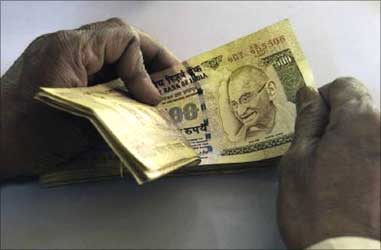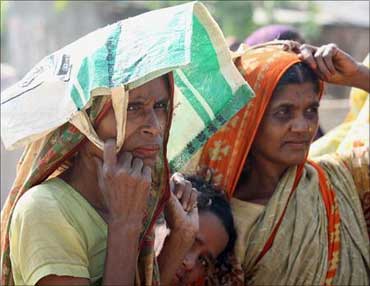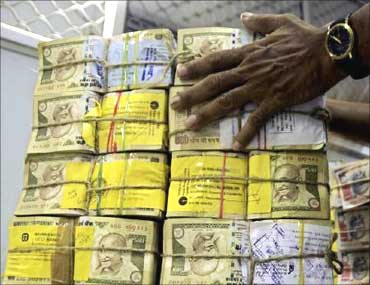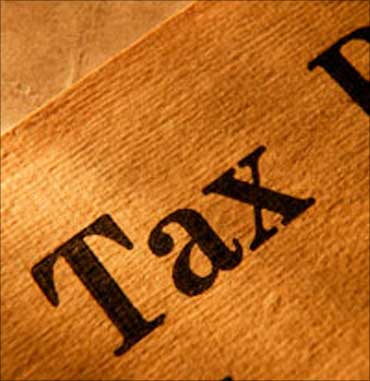Photographs: Reuters Tushar Poddar, Chief Economist, Goldman Sachs
Market participants will be keenly watching the government's fiscal deficit numbers, and any significant reforms.
We expect the central fiscal deficit for FY11 to come in at 4.9% of GDP largely due to the windfall on 3G telecom auctions and privatisation proceeds.
For FY12, even with revenue measures and slower growth in expenditures, we expect the central deficit to be slightly higher at 5.0% of GDP, largely as the one-off revenues would be considerably reduced.
In our view, the overall fiscal consolidation could impart a negative fiscal impulse after 3 years of positive impulse.
We think the risks to the deficit target are skewed to the upside due to continued spending pressures on food and fuel subsidies.
We believe the government could announce market borrowings of around Rs 3.8 trillion ($80 billion), which would be significantly higher than the borrowings in FY11, and we think on balance, this could be negative for government bonds.
. . .
Why govt borrowings may remain high in FY12
Image: Women queue in the summer heat to collect rice from a discount shop run by the government.Photographs: Rafiqur Rahman/Reuters
In terms of specific measures, on the taxation side, we expect some broad basing of the service tax, higher income tax exemptions, and a possible increase in excise duties on autos.
On the expenditure side, we expect the budget to have increases in food subsidies and National Rural Employment Guarantee Act, along with a continued increase in outlays on infrastructure.
Our sector analysts think the budget will be positive for the infrastructure and utilities sectors, and negative for iron-ore exporters and tobacco companies.
The FY12 Union Budget comes at a critical juncture for the economy - high inflation, tight liquidity, elevated fiscal and current account deficits, and a slowdown in the reform process have taken away the sheen from the India growth story.
Potentially, the Budget provides an opportunity to move towards fiscal consolidation and to make a bold statement on reform.
However, there are strong reasons, which could prevent such a move - state elections in 5 states over the summer, elevated inflationary pressures, and governance issues.
Moreover, this is a mid-term Budget, and with key tax reforms such as the GST and direct tax code a year away, we do not think there will be many surprises in the Budget.
. . .
Why govt borrowings may remain high in FY12
Image: Finance Minister Pranab Mukherjee.Photographs: Reuters
Fiscal consolidation sans 3G?
The primary focus of the budget remains how much the government can reduce its market borrowing.
In 2010-2011, the deficit was buoyed by one-off items - the much larger-than expected 3G and BWA telecom auctions (Rs 1060 billion), privatisation (Rs 227 billion), and higher nominal GDP growth.
Including these, we believe the central deficit could end at 4.9% of GDP, much lower than the budgeted figure of 5.5% of GDP.
However, if we exclude the one-off items from telecom and privatization, then the deficit could rise to 6.7% of GDP.
For FY12, we expect the fiscal deficit to remain at 5.0% of GDP including privatization and additional telecom receipts.
Without these, however, the deficit could come in higher at 5.5% of GDP. Yet, this can constitute some fiscal consolidation through higher revenues and current expenditures growing slower than nominal GDP.
. . .
Why govt borrowings may remain high in FY12
Image: A bank employee counts bundles of currency at a cash counter.Photographs: Jayanta Dey/Reuters
Our fiscal impulse estimates, which measures how much stimulus fiscal policy is providing to the economy suggest that the government impulse could be negative for FY12, if there is indeed the fiscal consolidation that we expect in the budget.
In FY11, the fiscal impulse was essentially zero excluding the telecom and disinvestment proceeds.
In terms of market borrowing, we think the government's net market borrowing could be higher at Rs 3.8 trillion ($80 billion), compared to a projected Rs 3.45 trillion ($76 billion) in FY11, as the one-off telecom receipts are not available in FY12.
We think the larger borrowing requirement at a time when liquidity remains very tight could be negative for government bonds.
. . .
Why govt borrowings may remain high in FY12
Tax proposals
The Budget may contain the following tax changes which would overall be revenue positive:
Income tax relief can be provided to lower income brackets to compensate for inflation. This could take the form of raising the tax exemption limit from the current 1.6 lakh ($3,500).
Excise duty on automobiles could be raised to 12% from 10%, rolling back the stimulus given during the financial crisis.
The tax base for the service tax will likely be expanded by including health and education services within its ambit.
Export duties on iron ore may be increased, as could excise taxes on tobacco companies.
Incentives for greater foreign investment in corporate bonds by reducing the withholding tax on interest income to 10% from 20%.
. . .
Why govt borrowings may remain high in FY12
Image: A labourer works under the National Rural Employment Guarantee Act to build a dirt road at Sheikhpur in Bihar.Photographs: Desmond Boylan/Reuters
Expenditure proposals
The National Rural Employment Guarantee Act (NREGA) could see a substantial increase in outlay. We estimate budget FY12 could make a provision of Rs 640 billion for the NREGA in 2011-2012, against Rs 401 billion in the current fiscal year.
Food subsidy bill may be increased, especially given the higher food prices.
The government has planned to free urea prices under the Nutrient-based Subsidy (NBS) policy regime, and as a result, could raise urea prices in the budget. This would help reduce fertilizer subsidies.
. . .
Why govt borrowings may remain high in FY12
Reforms
Market participants are looking for reforms in the areas of FDI in retail, a firm date for the GST, speedier resolution of land acquisition issues, and reducing fertilizer subsidies.
Any developments on these fronts could be seen as a positive.
However, given the challenges in front of the government, we do not envisage a major reform push in the Budget.









article